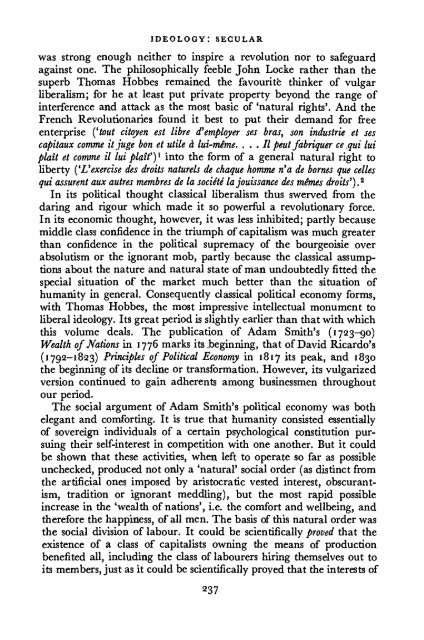- Page 1 and 2:
The Age ofRevolutioni789-1848ERIC H
- Page 3:
CONTENTSPREFACEINTRODUCTIONIXIPART
- Page 7 and 8:
PREFACETHIS book traces the transfo
- Page 9 and 10:
INTRODUCTIONWORDS are witnesses whi
- Page 11 and 12:
INTRODUCTIONideology of an individu
- Page 13:
Part IDEVELOPMENTS
- Page 16 and 17:
THE AGE OF REVOLUTIONavailable, all
- Page 18 and 19:
THE AGE OF REVOLUTIONfrom Veracruz
- Page 20 and 21:
THE AGE OF REVOLUTIONThese provinci
- Page 22 and 23:
THE AGE OF REVOLUTIONSouth America
- Page 24 and 25:
THE AGE OF REVOLUTIONthough these o
- Page 26 and 27:
THE AGE OF REVOLUTIONThe food of Eu
- Page 28 and 29:
THE AGE OF REVOLUTIONfor an early i
- Page 30 and 31:
THE AOE OF REVOLUTIONideology, thou
- Page 32 and 33:
THE AGE OF REVOLUTIONremain uncompl
- Page 34:
THE AGE OF REVOLUTIONtration. Excep
- Page 37 and 38:
THE INDUSTRIAL REVOLUTIONIf the sud
- Page 39 and 40:
THE INDUSTRIAL REVOLUTIONtheory of
- Page 41 and 42:
THE INDUSTRIAL REVOLUTIONThese cons
- Page 43 and 44:
THE INDUSTRIAL REVOLUTIONthe export
- Page 45 and 46:
THE INDUSTRIAL REVOLUTIONraw materi
- Page 47 and 48:
THE INDUSTRIAL REVOLUTIONsurprising
- Page 49 and 50:
THE INDUSTRIAL REVOLUTIONnarrowing
- Page 51 and 52:
THE INDUSTRIAL REVOLUTIONworks (com
- Page 53 and 54:
THE INDUSTRIAL REVOLUTIONment the i
- Page 55 and 56:
THE INDUSTRIAL REVOLUTIONof 1825 an
- Page 57 and 58:
THE INDUSTRIAL REVOLUTIONdemoralize
- Page 59 and 60:
THE INDUSTRIAL REVOLUTIONinvest it
- Page 61 and 62:
CHAPTER 3THE FRENCH REVOLUTIONAn En
- Page 63 and 64:
THE FRENCH REVOLUTIONfirst Hindu re
- Page 65 and 66:
THE FRENCH REVOLUTIONIt was therefo
- Page 67 and 68:
THE FRENCH REVOLUTIONone of the ear
- Page 69 and 70:
THE FRENCH REVOLUTIONharvest (i.e.
- Page 71 and 72:
THE FRENCH REVOLUTIONof 1793', if i
- Page 73 and 74:
THE FRENCH REVOLUTIONof the urban p
- Page 75 and 76:
THE FRENCH REVOLUTIONfound. In the
- Page 77 and 78:
THE FRENCH REVOLUTIONFor such men,
- Page 79 and 80:
THE FRENCH REVOLUTIONdecisive. More
- Page 81 and 82:
THE FRENCH REVOLUTIONof periodic co
- Page 83 and 84:
THE FRENCH REVOLUTIONa superbly eff
- Page 85 and 86:
CHAPTER 4WARIn a time of innovation
- Page 87 and 88:
WARby such intellectual support, an
- Page 89 and 90:
WARthose of France. These fall into
- Page 91 and 92:
WARrevolutionary tactic for the ant
- Page 93 and 94:
WARFrance, especially to a victorio
- Page 95 and 96:
WARagain at Friedland (1807), remai
- Page 97 and 98:
WARacres, happened to have no super
- Page 99 and 100:
WARre-establish legal feudalism onc
- Page 101 and 102:
WARany single major belligerent in
- Page 103 and 104:
WARthey had been transformed into c
- Page 105 and 106:
WARmean a major diversion of resour
- Page 107 and 108:
CHAPTER 5PEACEThe existing concert
- Page 109 and 110:
PEACEof the 'concert of Europe'. (B
- Page 111 and 112:
PEACEgood breeding-stock for the ro
- Page 113 and 114:
PEACEshowed much readiness to do so
- Page 115 and 116:
PEACEFrance overthrew its regime an
- Page 117 and 118:
CHAPTER 6REVOLUTIONSLiberty, that n
- Page 119 and 120:
REVOLUTIONStionary situation might
- Page 121 and 122:
REVOLUTIONSway, all of them reflect
- Page 123 and 124:
REVOLUTIONSin Britain it was inhibi
- Page 125 and 126:
REVOLUTIONSnecessary. The Bourbons
- Page 127 and 128:
REVOLUTIONSbetrayed them. There was
- Page 129 and 130:
REVOLUTIONSestablished forces intro
- Page 131 and 132:
REVOLUTIONSarchitect and the middle
- Page 133 and 134:
REVOLUTIONSpolitical passivity, the
- Page 135 and 136:
REVOLUTIONSinsurrection of 1848 onl
- Page 137 and 138:
REVOLUTIONSIberian countries, notab
- Page 139 and 140:
REVOLUTIONSA common fate and a comm
- Page 141 and 142:
NATIONALISMits primary concern with
- Page 143 and 144:
NATIONALISMThe great proponents of
- Page 145 and 146:
NATIONALISMmass of, say, Russians,
- Page 147 and 148:
NATIONALISMIIOutside the zone of th
- Page 149 and 150:
NATIONALISMand the language and hig
- Page 151 and 152:
NATIONALISMpolitically decisive Lat
- Page 153:
NATIONALISMMoslem far west was not,
- Page 157 and 158:
CHAPTER 8LAND/ am your lord and my
- Page 159 and 160:
LANDlords themselves into capitalis
- Page 161 and 162:
LANDfreely. Only thus would they mi
- Page 163 and 164:
LANDthere was no real hardship exce
- Page 165 and 166:
LANDthem, notably in Catholic count
- Page 167 and 168:
LANDland; the creation of a rural c
- Page 169 and 170:
LANDmore obviously the case where i
- Page 171 and 172:
LANDMalthus's and Ricardo's doctrin
- Page 173 and 174:
LANDand the world market, its econo
- Page 175 and 176:
LANDpauperizing 'Speenhamland Syste
- Page 177 and 178:
TOWARDS AN INDUSTRIAL WORLDevents o
- Page 179 and 180:
TOWARDS AN INDUSTRIAL WORLDDanube.
- Page 181 and 182:
TOWARDS AN INDUSTRIAL WORLDAfter 18
- Page 183 and 184:
TOWARDS AN INDUSTRIAL WORLD—the r
- Page 185 and 186:
TOWARDS AN INDUSTRIAL WORLDyoung Sa
- Page 187 and 188:
TOWARDS AN INDUSTRIAL WORLDseaboard
- Page 189 and 190:
TOWARDS AN INDUSTRIAL WORLDdid he e
- Page 191 and 192:
THE CAREER OPEN TO TALENTMoreover,
- Page 193 and 194: THE CAREER OPEN TO TALENTThe effect
- Page 195 and 196: THE CAREER OPEN TO TALENTGeorge Ste
- Page 197 and 198: THE CAREER OPEN TO TALENTThe Britis
- Page 199 and 200: THE CAREER OPEN TO TALENTtheir sons
- Page 201 and 202: THE CAREER OPEN TO TALENTcation. Th
- Page 203 and 204: THE CAREER OPEN TO TALENTtheir pare
- Page 205 and 206: THE CAREER OPEN TO TALENTgap betwee
- Page 207 and 208: THE CAREER OPEN TO TALENT1830s by e
- Page 209 and 210: THE LABOURING POORvainly against th
- Page 211 and 212: THE LABOURING POORgcrating. Neverth
- Page 213 and 214: THE LABOURING POORThat the conditio
- Page 215 and 216: THE LABOURING POORsorrow. Great mas
- Page 217 and 218: THE LABOURING POORIIIThe labour mov
- Page 219 and 220: THE LABOURING POORin Britain betwee
- Page 221 and 222: THE LABOURING POORrepresenting the
- Page 223 and 224: THE LABOURING POORthe looms on whic
- Page 225 and 226: CHAPTER 12IDEOLOGY: RELIGIONGive me
- Page 227 and 228: IDEOLOGY: RELIGIONlived up to the p
- Page 229 and 230: IDEOLOGY: RELIGIONwhose ideas expre
- Page 231 and 232: IDEOLOGY: RELIGIONboth Catholic and
- Page 233 and 234: IDEOLOGY: RELIGIONwhich sought not
- Page 235 and 236: IDEOLOGY: RELIGIONcommon man. Its h
- Page 237 and 238: IDEOLOGY: RELIGIONof the periods of
- Page 239 and 240: IDEOLOGY: RELIGION'I continue to de
- Page 241 and 242: IDEOLOGY: RELIGIONwhen they stop go
- Page 243: IDEOLOGY:SECULARreason, and were de
- Page 247 and 248: IDEOLOGY: SECULARism and stimulated
- Page 249 and 250: IDEOLOGY: SECULARthere flow, as fro
- Page 251 and 252: IDEOLOGY: SECULARSo far the new soc
- Page 253 and 254: IDEOLOGY: SECULARmerely attacking i
- Page 255 and 256: IDEOLOGY: SECULARserious intellectu
- Page 257 and 258: IDEOLOGY: SECULARadvance, combined
- Page 259 and 260: IDEOLOGY: SECULARall readers are pa
- Page 261 and 262: CHAPTER 14THE ARTSThere is always a
- Page 263 and 264: THE ARTSarts and genres. Literature
- Page 265 and 266: THEARTSbefore as a popular rather t
- Page 267 and 268: THE ARTSthe standard approach of ni
- Page 269 and 270: THE ARTSone. Architects and enginee
- Page 271 and 272: THE ARTSteenth century science and
- Page 273 and 274: THE ARTSof the Church of England fa
- Page 275 and 276: THE ARTSof the past, and as the fre
- Page 277 and 278: THE ARTSDaumier's lithograph of the
- Page 279 and 280: THE ARTSnational aristocratic cultu
- Page 281 and 282: THE ARTSBourgeois girls might play
- Page 283 and 284: THE ARTSthe more so as in Western E
- Page 285 and 286: CHAPTER 15SCIENCELet us never forge
- Page 287 and 288: SCIENCENormde Superieure (1794) whi
- Page 289 and 290: SCIENCEis to say they remained subs
- Page 291 and 292: SCIENCEreal-life surfaces to which
- Page 293 and 294: SCIENCESimon,* and its most formida
- Page 295 and 296:
SCIENCEthe historical sciences, how
- Page 297 and 298:
SCIENCEalarming development: the ac
- Page 299 and 300:
SCIENCEcollection, classification a
- Page 301 and 302:
SCIENCESuch direct derivations expl
- Page 303 and 304:
SCIENCEthan that he did not feel ha
- Page 305 and 306:
CHAPTER 16CONCLUSION: TOWARDS 1848P
- Page 307 and 308:
CONCLUSION: TOWARDS 1848to fend it
- Page 309 and 310:
CONCLUSION: TOWARDS 1848other count
- Page 311 and 312:
CONCLUSION: TOWARDS 1848in Algeria.
- Page 313 and 314:
CONCLUSION: TOWARDS 1848is now thou
- Page 315 and 316:
CONCLUSION: TOWARDS 1848moreover, o
- Page 319 and 320:
CHUtLtSWCWEUROPE in 184OGerman Conf
- Page 321 and 322:
WESTERJM CULTURE 1815 — 1848:OPER
- Page 323 and 324:
THE WORKSHOP of the WORLDBritish co
- Page 325 and 326:
i^ ^Arco under Code Civilaft«r 181
- Page 327 and 328:
NOTES4 cf. A. E. Musson & E. Robins
- Page 329 and 330:
NOTES4 A. Sorcl, V Europe et la rev
- Page 331 and 332:
NOTESRecherches sur I'Alsace NapoUo
- Page 333 and 334:
NOTES20 Louis Chevalier, Classes La
- Page 335 and 336:
NOTESCHAPTER 13: IDE OLOGY:SECULARi
- Page 337 and 338:
BIBLIOGRAPHYBOTH the subject and th
- Page 339 and 340:
BIBLIOGRAPHYcommand (1948) is among
- Page 341 and 342:
BIBLIOGRAPHYography is gigantic for
- Page 343 and 344:
BIBLIOGRAPHYlution, reaction: econo
- Page 345 and 346:
Babbage, Charles, scientist, 186, 2
- Page 347 and 348:
INDEXCaucasus, Caucasian, 108, 139,
- Page 349 and 350:
INDEXEncyclopaedia of Domestic and
- Page 351 and 352:
Halle, 204, 287Halls of Science, 21
- Page 353 and 354:
Lamennais, H.-F. R. de, religious w
- Page 355 and 356:
INDEXMorning Post, 53Morocco, 144Mo
- Page 357 and 358:
Protestant, 138, 152, 186, «04, 21
- Page 359 and 360:
INDEXSerbs, Serbia, 105, 140, 266,
- Page 361:
Vitkovice, 173Volga, River, 14Volta



